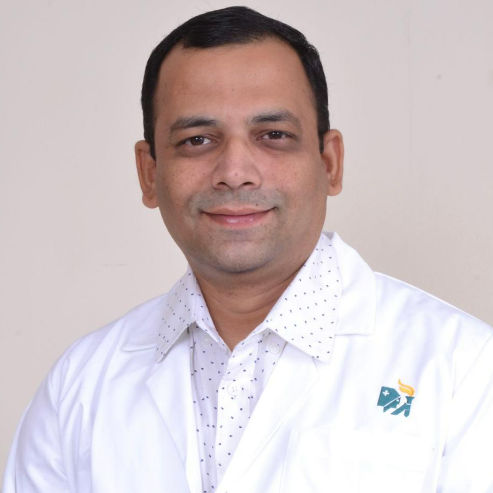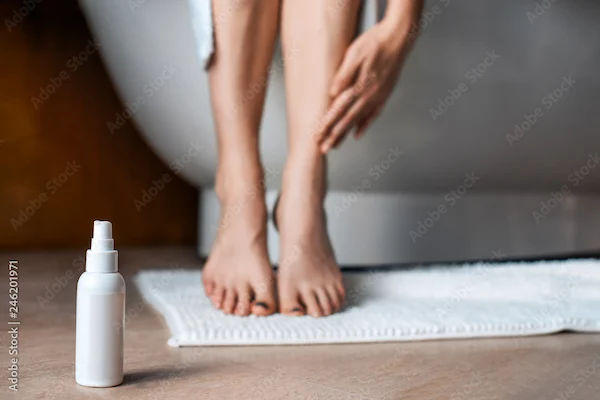How To Reduce Oedema In Feet: Diagnosis, Treatment & More
Learn how to reduce foot oedema through effective lifestyle changes, medical treatments, and prevention strategies. Understand its causes, symptoms, and management tips.

Written by
Last updated on 3rd Jul, 2025
Oedema, swelling of the legs and feet caused by extra fluid, can be annoying and occasionally concerning. Though it may be caused by something as trivial as standing for too long, it can also indicate problems with an underlying condition.
This article covers medical conditions associated with oedema, lifestyle factors, diagnostic strategies, treatment alternatives, and major lifestyle changes.
Medical Conditions Associated with Oedema
There can be several serious underlying medical issues which can result in oedema. Here are a few examples:
Heart Failure and Oedema: When the body builds up salt and water from heart failure, swelling in the feet can occur. In case the heart is damaged, it struggles to pump blood around the body efficiently, causing fluid to build up.
Kidney Disease Angioedema: Kidney diseases, such as nephrotic syndrome, can lead to fluid retention and oedema due to the kidneys' reduced ability to retain salt and excrete water. Chronic kidney disease also can cause oedema.
Liver Disease and Oedema: Conditions that affect the liver, such as cirrhosis, can also cause fluid retention, resulting in oedema.
Furthermore, if individuals experience unexplained swelling in the legs, they must visit a healthcare provider for proper diagnosis.
Lifestyle Contributors to Oedema
Some lifestyle factors may increase fluid retention and lead to toe oedema. Before enumerating these factors, here’s some general context. The body constantly regulates fluids, which daily habits and choices can greatly influence. By identifying and adjusting these variables, people can prevent and manage oedema. These factors include:
Dietary Factors Affecting Fluid Retention
A high-sodium diet can exacerbate oedema when combined with other conditions. Low-protein intake malnutrition is also a cause of hypoalbuminaemia and can lead to oedema.
Impact of Sedentary Lifestyle
Sitting or standing for long periods, particularly in the heat, can lead to oedema. Sedentary lifestyles can also restrict blood flow, increasing the possibility of swelling in the legs.
Making the right lifestyle changes can help manage and relieve this condition.
Identifying the Symptoms of Oedema
The primary symptom is swelling or tissue puffiness under the skin and peripheral (frequently legs or arms). Also, the skin might look tight or shiny. Here are some symptoms to look out for:
The limb widens, or the body part expands impressively if oedema occurs.
The overlying skin around the swollen area can be tightened and painful.
Stretched or shiny skin may suggest extensive fluid accumulation in the underlying tissues.
The skin in the affected area may hold a dimple (pitting) after being pressed. Additionally, there might be discomfort and limitation of motion in the affected region:
To determine pitting oedema, press down firmly on the swollen area for a few seconds to see if a depression or "pit" remains after the pressure is released.
The depth and duration of the pit can help assess the severity of the condition.
Oedema can restrict the range of motion in affected joints and lead to difficulty carrying out daily activities.
If oedema comes with chest pain or difficulty breathing, get emergency help immediately.
Diagnostic Approach for Oedema
One should consider visiting a healthcare provider for oedema in case they notice the following:
Pain or skin discolouration in the swollen area.
An open sore developing on the swollen area.
Shortness of breath or difficulty breathing.
Swelling in only one limb which may indicate an underlying issue.
Difficulty walking or restricted movement due to swelling.
If any of the above symptoms persist, one should visit a healthcare provider. They will do the following:
Conduct a physical examination of the affected region.
Look for swelling, especially in regions with a stretched or shiny appearance.
Suggest the following tests to identify the underlying cause:
Blood tests
Urine tests
Imaging tests
These tests facilitate precise and prompt detection of the cause, which can enhance health outcomes.
Consult Top General Physicians To Know Which Tests To Take
Treatment Options for Oedema
The treatment of oedema depends on its severity, which is typically assessed via a pitting test. Healthcare providers press on the swollen area to see to what degree the skin bounces back. The grading scale includes:
Grade 1: 2mm pit, rebound immediately
Grade 2: Pits of 3-4mm, rebound in ≤15 secs
Grade 3: 5-6mm pit; takes 15-60 seconds to rebound
Grade 4: 0.314 pit, lasts around 2-3 minutes
Based on the assessment, the doctor can recommend the following:
To quit smoking if the oedema was caused due to lung disease.
In case the oedema occurs with chronic heart failure, they will ask the patient to monitor their salt intake, fluid intake and weight.
If the oedema occurs due to a medication side effect, the doctor may lower or stop the dosage to reduce swelling.
Home Remedies and Natural Treatments
Apart from medication and the healthcare provider’s recommendations, here are a few tips to follow:
Reduce salt intake
Maintain a healthy weight
Exercise regularly
Elevate legs for better circulation
Wear support stockings
Lifestyle Modifications for Oedema
Following are a few crucial lifestyle modifications to reduce oedema:
Sit or lie down with the legs up to reduce swelling.
Wear compression garments such as socks, sleeves or stockings to facilitate the movement of fluids.
Avoid prolonged pressure, injuries, and extreme temperatures over swollen areas.
Be especially gentle with skin where swelling has occurred since injuries can heal more slowly and may be more prone to infection.
Prevention Strategies for Oedema
Some effective prevention strategies for oedema include:
Stay active. Do not remain seated or in the same position for long, and move about periodically.
Eat limited sodium and maintain a balanced diet.
Follow doctor’s guidelines regarding medication and exercise.
Keep a healthy weight to reduce pressure on legs.
Wear compression socks and oedema shoes to minimise foot/ankle swelling.
Stay away from tight clothing that restricts circulation.
Timely diagnosis and management of the underlying illness can prevent complications. In this regard:
Check feet and ankles regularly for signs of swelling, redness or skin changes.
Keep a journal of symptoms and any suspected triggers.
Share any concerns with the healthcare provider right away.
Special Considerations for Oedema
Some populations need special consideration about oedema. They include:
Oedema in Pregnancy
Hormonal changes in pregnancy can lead to oedema, as well as increases in blood volume. Thus, pregnant women should discuss management strategies with the healthcare provider:
Among them are elevating the legs, using compression stockings and staying hydrated.
When seated for long periods, try not to cross the legs.
Discuss any other concerns with the doctor to rule out possible medical conditions.
Oedema in Elderly Populations
Older adults are at greater risk for developing oedema as their cardiovascular and kidney functions decline with age. Therefore, management strategies should be modified according to geriatric requirements and health issues:
Older patients may have multiple medical conditions contributing to oedema.
Medication management is key as certain medications can cause or worsen oedema.
Regular checkups for kidney and heart function are crucial while treating this condition.
Conclusion
Timely identification and proper treatment of underlying conditions improve health outcomes and prevent complications from recurring. With healthy lifestyle choices and the support of medical professionals, oedema can often be successfully managed, improving the quality of life for affected individuals.
Consult Top General Physicians
Consult Top General Physicians

Dr. Rajib Ghose
General Practitioner
25 Years • MBBS
East Midnapore
VIVEKANANDA SEBA SADAN, East Midnapore
Dr. Sujay P R
General Physician/ Internal Medicine Specialist
3 Years • MBBS
Bengaluru
PRESTIGE SHANTHINIKETAN - SOCIETY CLINIC, Bengaluru

Dr. Ashita Kuruvilla
General Practitioner
6 Years • MBBS
Kolkata
KVC CLINIC, Kolkata

Dr. Arpit Pandey
General Practitioner
7 Years • MD (Physician)
Gurugram
MedVain, Gurugram
(25+ Patients)

Dr. Kiran Macha
General Physician/ Internal Medicine Specialist
21 Years • MBBS,MD General Medicine
HYDERABAD
Sri Clinic, HYDERABAD
(100+ Patients)
Consult Top General Physicians To Know Which Tests To Take

Dr. Rajib Ghose
General Practitioner
25 Years • MBBS
East Midnapore
VIVEKANANDA SEBA SADAN, East Midnapore
Dr. Sujay P R
General Physician/ Internal Medicine Specialist
3 Years • MBBS
Bengaluru
PRESTIGE SHANTHINIKETAN - SOCIETY CLINIC, Bengaluru

Dr. Ashita Kuruvilla
General Practitioner
6 Years • MBBS
Kolkata
KVC CLINIC, Kolkata

Dr. Arpit Pandey
General Practitioner
7 Years • MD (Physician)
Gurugram
MedVain, Gurugram
(25+ Patients)

Dr. Kiran Macha
General Physician/ Internal Medicine Specialist
21 Years • MBBS,MD General Medicine
HYDERABAD
Sri Clinic, HYDERABAD
(100+ Patients)


.webp)